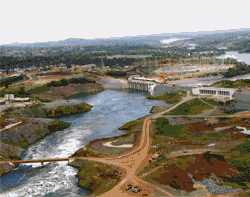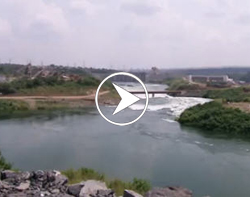
- 250 MW Hydro-electric power station on the Nile River
- Significantly improved the supply of safe and reliable electricity
- Reduces dependence on expensive imported fuel
- One of the largest investments ever in sub-Saharan Africa



Largest Hydroelectric Project Ever Undertaken in Africa Will Double Uganda's Capacity
The Bujagali Hydroelectric Project ("BHP"), which commenced commercial operations in August 2012, is a 250 MW run-of-river hydro facility located on the Nile River in the Republic of Uganda. BHP is the largest privately financed hydroelectric plant in Sub-Saharan Africa and the largest power investment in East Africa.
BHP has catalyzed economic growth in Uganda by nearly doubling the country's peak generation capacity and by providing renewable power at a price that is two-thirds lower than the cost of the thermal generation that BHP replaced. Prior to BHP's commissioning, power shortages were constraining GDP growth by an estimated 1% to 2% per year, which undermined Uganda's efforts toward accelerating industrial development, creating employment and alleviating poverty. Upon commissioning, BHP eliminated routine load-shedding and enabled the Government of Uganda ("GOU") to cut the roughly US $110 million per year in subsidies that were needed to pay for inefficient and polluting diesel generation.
The project has increased the proportion of Uganda's electricity generated from renewable sources to 90%, making the Ugandan electrical generating system one of the cleanest in the world. BHP is registered as the largest renewable Clean Development Mechanism project in Africa, reducing carbon emissions in Uganda by nearly 900,000 tons per year. Further, BHP is a run-of-river project (i.e. no storage reservoir) that reutilizes water that has been released from upstream hydroelectric facilities.
In addition to direct job creation, the project included the implementation of considerable community development and social action plans such as (i) the construction and upgrades of health centers, homes and schools, (ii) the extension of city water services and drilling of water wells, (iii) a rural electrification program, (iv) vocational and skills training initiatives, as well as (v) a microfinance program.
BHP has been undertaken as a Public-Private Partnership between the GOU and the state-owned transmission company, Uganda Electricity Transmission Company Limited ("UETCL") on the one hand, and Sithe Global and Industrial Promotion Services (Kenya) ("IPS") on the other. Sithe Global and IPS were selected pursuant to a competitive international bidding process and, together with the GOU, comprise the owners of the project.
BHP was awarded the Africa Power Deal of the Year 2007 by Euromoney "Project Finance Magazine". The project has twelve lenders, including multilateral and bilateral development banks as well as commercial banks such as the European Investment Bank ("EIB"), International Finance Corporation ("IFC"), African Development Bank ("AfDB"), Nederlandse Financierings-Maatschappij voor Ontwikkelinsslanden N.V. ("FMO"), Societe de Promotion et de Participation pour la Cooperation Economique ("Proparco")/Agence Francaise de Developpement ("AFD"), DEG-Deutsche Investitions-und Entwicklungsgesellschaft MBH ("DEG")/KfW, Standard Chartered, Barclays/Absa Capital, BNP Paribas Fortis and Nedbank. The commercial lenders are provided with a Partial Risk Guarantee ("PRG") from the International Development Association ("IDA").
EXTERNAL LINKS
For more information on the Bujagali HEP, see www.bujagali-energy.com.
For more information on IPS, see http://www.akdn.org/akfed_ips.asp.
For more information on GOU, see www.statehouse.go.ug.
